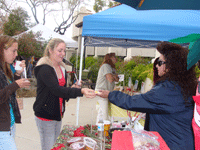It was 15 years ago that Regina Loew excitedly told her son about organic arugula. At that time, Stewart had been living in New York City for six years, working in sound production and as a fill-in prop boy for David Letterman and Saturday Night Live.
But Agua Linda Farm, and its great Santa Cruz Valley backdrop--and all that arugula--kept calling him home.
Stewart was born on Agua Linda Farm, about 40 miles south of Tucson just off of Interstate 19, during a time when the Farmers Investment Co. (FICO) farmed 500 acres. His early years were spent with a half-dozen farm families living a pastoral existence of swimming in irrigation ditches, playing baseball with the workers' kids and waking up to the smell of fresh tortillas.
The former Regina Groves was an actress when she met Arthur Loew Jr., a movie producer. Stewart's great-grandfathers--Marcus Loew and Adolph Zukor--started MGM and Paramount Pictures, respectively. And it was perfectly normal for a boy who swam in irrigation ditches to also watch his mother host celebrities Natalie Wood, Robert Wagner, Quincy Jones and Elizabeth Taylor at Agua Linda Farms.
Fifteen years ago, only a tiny number of people knew about the organic-produce movement. Back from New York, Stewart had to make farming work and did so through a variety of distribution channels. Four years ago, he says, he found "the best concept yet to hit the small modern farmer": community supported agriculture (CSA).
In a CSA, people put their money up front to buy a share in the farm. "CSAs allow farmers seed money," said Laurel Loew, Stewart's wife. "We can get creative by trying new crops and not worry about surplus." Shareholders also feel more invested in the farm. On volunteer days, they get their hands in the dirt to see what goes into planting fava beans or harvesting garlic--and on a weekly designated day, time and location, they pick up their share of freshly harvested crops.
After joining the Tucson CSA in April 2008, Agua Linda Farms' shareholders expanded from 33 to 140. "Growth is good; we have the acreage for 1,000 shareholders," said Stewart. "But every step is so expensive. Systems need to be in place beyond the growing and selling."
Laurel explained further about how the growth comes with drawbacks: "We used to take an order on the phone and jot it down on a piece of paper. Now, we have a color-coded label system, and every entry has to be computerized."
A stroll around the farm kindles a sense of peacefulness amidst the shady mesquite bosque and layers of patchwork greenness as far as the eye can see, juxtaposed against the magnificent Santa Rita and Sierrita mountain ranges. This enterprising and energetic couple also employs the serene setting as a wedding venue--Congresswoman Gabrielle Giffords and her astronaut beau, Mark E. Kelly, were married here.
Every month, Agua Linda Farm hosts an outreach event--a talk and tour, or perhaps a movie night in the pasture or a watermelon seed-spitting contest. During the harvest month of October, the great pumpkin festival happens every weekend. In the fall and summer, more than 2,000 schoolchildren make field trips to the farm, where retired teachers are welcome to assist.
The farm has grandfathered water rights, but still, the Loews worry about water. Arizona has an estimated 20 years of sufficient water supplies. With the high cost of fuel and population explosion, Tucson must decide whether or not to be sustainable by supporting its local farmers. "If people don't start buying local, it's bye-bye, local, as developers take over, building more golf-course communities," said Stewart.
Currently, most of the labor is done by hand by World-Wide Opportunities on Organic Farms volunteers, who are usually self-starting post-graduates who are attracted to the hands-on local-farm movement. Some come from other states--and as far as Israel--to work side by side with Future Farmers of America high school students from Rio Rico. WWOOFers don't get paid, but their accommodations and meals are absorbed by the host farm in exchange for on-the-job learning.
With the surge of growth, the Loews have to find ways to mechanize while still committing to a low carbon footprint.
"Tucson has to start supporting its small farmers, not just Agua Linda Farms, but Avalon Gardens (in Tumacacori) ... and Willcox agriculture," says Stewart. "We have to get way beyond bumping into each other at the Food Conspiracy Co-Op, Aqua Vita and local farmers' markets. When the mainstream embraces us, prices will go down and reflect the local food-economy costs, so we're not competing against California. When you buy from a local farm, there's unlikely to be a tomato salmonella scare, and if there is, it can be traced immediately."







